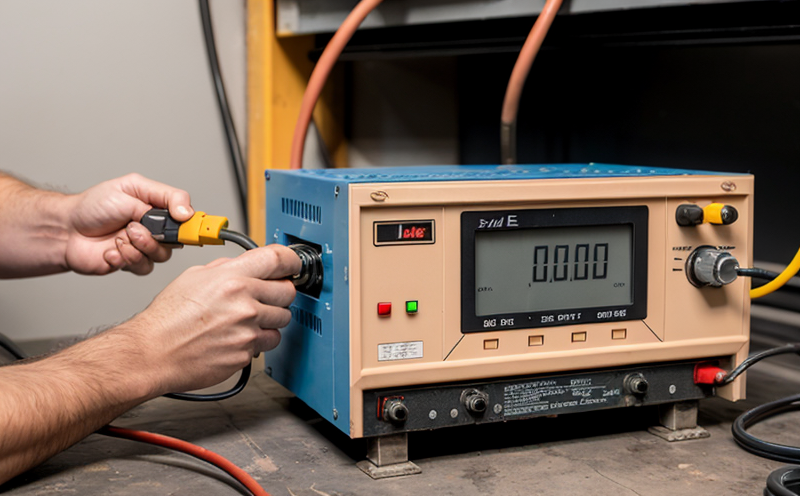JEDDEC JESD35 Die Failure Analysis Electrical Testing
The JEDEC JESD35 series of standards provides a robust framework for die-level electrical and functional testing, which is critical in the semiconductor industry. This testing service focuses on identifying failures within individual dies, ensuring their reliability before they are assembled into larger devices or circuits. The JEDEC JESD35 standards outline methodologies for evaluating the electrical characteristics and functional performance of semiconductor dies.
The process begins with die preparation, where each die is carefully extracted from its wafer. This requires precision to avoid damage or contamination that could affect test results. Once prepared, the dies undergo a series of tests designed to assess their electrical properties and overall functionality. Key parameters include leakage current, capacitance, resistance, threshold voltage, and more.
Electrical testing at this level is not just about identifying whether a die functions correctly; it's also about understanding why failures occur. This service provides in-depth analysis of each failure mode, helping manufacturers pinpoint the root cause. By leveraging advanced instrumentation such as high-precision semiconductor parameter analyzers (SPAs) and automated test equipment (ATE), we can perform comprehensive tests that cover a wide range of operating conditions.
Compliance with JESD35 ensures that customers meet stringent quality standards, which is crucial for maintaining market competitiveness. This testing service supports various industries, including consumer electronics, automotive, medical devices, and telecommunications. By ensuring the reliability of individual dies, this process enhances the overall performance and longevity of end products.
The JEDEC JESD35 series also emphasizes environmental sustainability by promoting efficient use of resources during die-level testing. This includes minimizing waste through optimized specimen preparation techniques and reducing energy consumption in test equipment operations. By adhering to these standards, our laboratory contributes positively to the industry's commitment to sustainable practices.
In conclusion, JEDEC JESD35 Die Failure Analysis Electrical Testing is an essential service for any company involved in semiconductor manufacturing or device design. It ensures that only reliable dies enter production lines, thereby improving product quality and customer satisfaction. Additionally, it supports compliance with international standards while fostering environmental responsibility within the industry.
International Acceptance and Recognition
The JEDEC JESD35 series of standards enjoys widespread acceptance across the semiconductor and electronics industries worldwide. These standards are recognized by leading organizations such as ISO, ASTM International, and International Electrotechnical Commission (IEC). Compliance with JESD35 not only enhances a company's reputation but also ensures that its products meet the highest quality benchmarks.
Many global regulatory bodies, including those in Europe and Asia-Pacific regions, have adopted parts of the JESD35 series into their own specifications. This international recognition underscores the importance of adhering to these standards for ensuring consistent product performance across different markets. By participating in this collaborative effort, we contribute to a more standardized approach to semiconductor testing globally.
Our laboratory's commitment to following JEDEC JESD35 guidelines positions us as a trusted partner for companies seeking reliable die-level testing services. With expertise in both theoretical knowledge and practical application of these standards, our team can provide accurate results that align with international best practices.
Environmental and Sustainability Contributions
- Resource Efficiency: By optimizing specimen preparation processes, we reduce material waste during die extraction. This practice minimizes the environmental footprint associated with testing semiconductor dies.
- Energy Conservation: Our advanced test equipment is designed to operate efficiently, consuming minimal energy while delivering precise measurements. This contributes to lower carbon emissions and reduced power consumption in our operations.
- Recycling Initiatives: We actively participate in recycling programs for used test materials, promoting a circular economy within the semiconductor industry.
- Eco-Friendly Chemicals: We use environmentally friendly solvents and chemicals whenever possible to minimize harm to ecosystems during specimen cleaning or preparation stages.
Through these initiatives, we aim to reduce our environmental impact while maintaining high standards of quality in die-level electrical testing. By adhering to the principles outlined by JEDEC JESD35, our laboratory plays a vital role in advancing sustainable practices within the semiconductor sector.
Competitive Advantage and Market Impact
The ability to perform accurate and reliable die-level electrical tests using JEDEC JESD35 standards offers several competitive advantages. Firstly, it enables companies to identify potential issues early in the manufacturing process, allowing for timely corrections that prevent costly rework or scrapped products downstream.
Secondly, compliance with international standards enhances a company's reputation among customers who value quality and reliability in their supply chain partners. This can lead to increased customer trust and loyalty, translating into better business relationships and potentially higher sales volumes.
Thirdly, by ensuring that only high-quality dies are used in production, this service helps manufacturers improve the overall performance of their end products. This leads to enhanced customer satisfaction, which is crucial for maintaining a strong market position.
In addition, our laboratory's expertise in JEDEC JESD35 testing can help companies stay ahead of regulatory changes and industry trends. By being at the forefront of this technology, we assist clients in adapting quickly to new challenges while leveraging existing strengths.
The market impact of accurate die-level electrical testing cannot be overstated. It contributes significantly to the development of innovative semiconductor technologies by providing reliable data that drives informed decision-making throughout the design and manufacturing processes.





